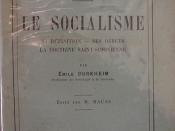Elizabeth Jennings 3/10/10 Matters of Psychological Differences in Religious Analysis
Psychological considerations have proved invaluable to religious analysis. Because religion is both an internal and an external institution, it is difficult to exclude the attributes which are primarily mental. Both Durkheim and Weber use psychological interpretations, but their approach drastically differs. Durkheim resolutely claimed to avoid psychological assessments but used this type of inference to resolve the relationship between man and religion. Weber, however, openly utilized p p sychological evaluations, in respect to actual data, in order to show the ultimate implications of religious values.
Despite his attempts to refrain from the subjective and vague tendencies of psychological interpretation, Durkheim's key arguments depend on purely psychological analysis. Rather than excluding general personal experiences, he considers the effect on the psyche that physical events h ave. Religion, he contends, is created by the conflict these physical facts have with basic emotions.
When faced with challenges, "the modes of action they advised or prescribed to man could only rarely been effective: illnesses are not cured through purifying rituals, nor do crops grow because of chants and sacrifices⦠If religious faith was not born to ensure man's harmony with the material world, the errors it made him commit in his struggles with the world would have had little effect because it was nourished from another source. If people became believers for reasons other than this, they must have continued to believe even when these reasons were contradicted by facts. Faith must have been quite strong then not only to withstand these contradictions, but to deny them and prevent the believer from taking them to heart. In effect, such faith made them inoffensive to religion. When religious feeling is intense, it does not accept that religion could be guilty and easily suggests explanations...


